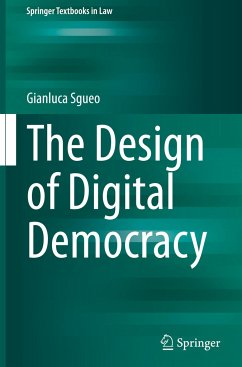Ever-stronger ties between technology, entertainment and design are transforming our relationship with democratic decision-making. When we are online, or when we use digital products and services, we tend to focus more on certain factors like speed of service and user-friendliness, and to overlook the costs - both for ourselves and others. As a result, a widening gap separates our expectations of everything related to digitalization - including government - and the actual practice of democratic governance. Democratic regulators, unable to meet citizens' demands for tangible, fast and gratifying returns, are seeing the poorest results ever recorded in terms of interest, engagement and retention, despite using the most cutting-edge technologies.
This book explores various aspects of the relationship between democracy, technology and entertainment. These include, on the one hand, the role that digital technology has in strengthening our collective intelligence, nurturingempathic relations between citizens and democratic institutions, and supporting processes of political aggregation, deliberation and collaboration. On the other hand, they comprise the challenges accompanying digital technology for representation, transparency and inclusivity in democratic decision-making.
The book's main argument is that digital democratic spaces should be redesigned to narrow the gap between the expectations and outcomes of democratic decision-making. It suggests abandoning the notion of digital participatory rights as being fast and easy to enjoy. It also refutes the notion that digital democratic decision-making can only be effective when it delivers rapid and successful responses to the issues of the day, regardless of their complexity.
Ultimately, the success or failure of digital democracy will depend on the ability of public regulators to design digital public spaces with a commitment to complexity, so as to make them appealing, but also effectiveat engaging citizens.
This book explores various aspects of the relationship between democracy, technology and entertainment. These include, on the one hand, the role that digital technology has in strengthening our collective intelligence, nurturingempathic relations between citizens and democratic institutions, and supporting processes of political aggregation, deliberation and collaboration. On the other hand, they comprise the challenges accompanying digital technology for representation, transparency and inclusivity in democratic decision-making.
The book's main argument is that digital democratic spaces should be redesigned to narrow the gap between the expectations and outcomes of democratic decision-making. It suggests abandoning the notion of digital participatory rights as being fast and easy to enjoy. It also refutes the notion that digital democratic decision-making can only be effective when it delivers rapid and successful responses to the issues of the day, regardless of their complexity.
Ultimately, the success or failure of digital democracy will depend on the ability of public regulators to design digital public spaces with a commitment to complexity, so as to make them appealing, but also effectiveat engaging citizens.








